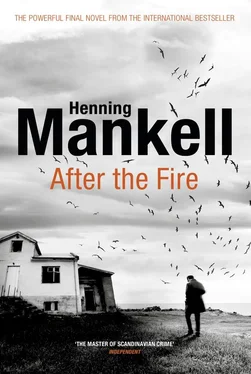I sat up. It was ten o’clock; I had been asleep for a long time. There was no sign of Louise. I called her phone, but she didn’t answer. I started to leave a message but broke off after a few words. What was the point? I made coffee. The wind had picked up, and it was pouring with rain. I lay down again; all I wanted to do was go back to sleep.
Instead I grabbed my torch and went out into the rain. The mossy rocks were even more treacherous now, and I fell over twice on my way up to the bench. When I eventually made it I could see that the fire on the skerry had gone out, or been extinguished. The place was in darkness.
So Louise had decided to stay over there. She had taken over my tent and left me the caravan.
My wet hair was plastered to my forehead. I flashed the torch a few times, but needless to say there was no response.
I slithered down the hill, wondering why Louise was torturing me like this. I sat down at the table and began to play patience. It didn’t come out, of course. I gathered up the cards and made a decision.
Tomorrow I would ask Louise to leave my islands. I couldn’t have her here.
I lay awake for hours. The pillow carried the faint scent of the soap she used, which made it impossible for me to stop brooding over why she was out there in the darkness in my tent.
Over and over again I got up, flicked through books and magazines that had been here since Harriet’s time.
I might have dozed for an hour or so around daybreak, but when the autumn morning filtered through my window, I got up. I had a cup of coffee, then went up the hill with Harriet’s binoculars. There was no sign of movement around the tent. The flap was closed.
I knew exactly what to do now. I bailed out all the water that had gathered in the skiff and set off for the skerry. The sun had just risen above the horizon, and the water shone like a mirror. It was the coldest autumn day so far this year. Several gulls were screaming and fighting over some invisible prey a short distance away. It might have been the rotten seal, if Jansson hadn’t already towed it ashore and buried it under a pile of seaweed and sand.
I rowed around the skerry. When I had only a few strokes left before the depths turned into a steeply shelving shallow leading onto the rocks, my gaze fastened on something that appeared to be floating just metres below the surface. I slowed down and leaned over the side. At first I couldn’t make out what it was, then I realised it was part of a drift net that had broken free, and was now at the mercy of the winds and the currents. It was festooned with dead fish, a diving duck and ribbons of seaweed. I had never seen an escaped fishing net before. As I gazed down into the silent water, the net reminded me of a prisoner who has scaled a high wall and is now fleeing for his life. Or perhaps it was more like a stray dog, and no one knew where it was going.
The sun disappeared behind a bank of cloud, and I could no longer see the net. I clambered ashore on the far side of the skerry, then hauled the boat up onto the rocks, taking care not to make any noise. I secured the mooring rope with a heavy chunk of stone that had fallen away, then made my way towards the tent. I couldn’t be sure that Louise wasn’t lying awake in there. If she heard footsteps outside, she might be scared. I didn’t want that. Even if we regularly launched symbolic attacks on one another, I didn’t want to frighten her.
I crouched down, put my ear to the fabric of the tent and listened. Could I hear her breathing or not? The sun slipped in and out behind the scudding clouds. I straightened up and went over to the sheltered spot where I usually build a fire. The surface of the rock was blackened from my earlier efforts. Louise had chosen a different place that was less suitable. I gathered up branches, twigs, a plank from an old fish box that had drifted ashore, and covered the whole lot with moss. Then I lit a fire. There wasn’t a breath of wind; the smoke rose straight up into the sky.
I settled down to wait. I had yet to decide how I was going to explain my presence outside the tent.
I fed the fire with more branches and twigs. From time to time I scrambled around the skerry in order to keep the cold and the tiredness at bay.
One hour passed, almost two.
I heard something from inside the tent, but at first I couldn’t work out what it was. I moved closer, put my ear against the side.
My daughter was weeping. I hadn’t seen her cry since Harriet died. She was sometimes unhappy, downhearted, but never enough for the tears to fall. At least not as far as I was aware.
It was upsetting, hearing her cry. I had no idea what to do. I went back to the fire, thinking that it was probably best if I left and returned to the island. But I couldn’t put out the fire without her hearing the hiss of the water as I doused the flames.
I sat there listening to my daughter. I looked at my watch so that I would know how long she cried for. She stopped after fifteen minutes. She must be in terrible pain, I thought.
Silence. I carried on waiting.
I heard her yawn, then she opened the tent flap. The zip stuck, as it always did for me. Her hair was standing on end. It was a few seconds before she noticed me; she froze in the opening as if she couldn’t decide if I really was there. Then she got to her feet and went behind one of the rocks that provides shelter from the east. When she came back she had combed her hair. She fetched the pillow from inside the tent and sat down by the fire.
‘You could have made some coffee, seeing as you’re here,’ she said.
I didn’t reply. I had no intention of asking any questions until she explained why she had taken the boat when she knew I had to get to the police station. Just like her mother Harriet, she has the ability to confuse people when she doesn’t have the upper hand, and then she steers the conversation in a completely different direction.
I always thought I was considerably more intelligent than Harriet, but I have come to realise that my daughter is a dangerous opponent.
‘How did it go?’ she asked.
‘How did what go?’
‘The interview with the police. Did they beat you up like you said in your message?’
‘With batons.’
She suddenly seemed tired. She became someone else, pale and shrunken. I thought vaguely that she must have looked exactly like that when she was a child, when she lived with Harriet and didn’t even know I was her father.
‘Can’t we have a conversation like adults for once?’ she said.
‘They didn’t beat me up. They suspect me of having started the fire, but they have no evidence. And I didn’t do it, either deliberately or by accident.’
‘So how did it happen?’
‘I want answers just as much as you do.’
Louise got up, went into the tent and came back with a bottle of water. She constructed a stand so that she could hang the coffee pot above the fire, then she fetched the Thermos flask and my cup, which I had left in the tent. She gave me the mug and kept the cup for herself. There were a couple of spoonfuls of instant coffee in the bottom of the mug.
A gust of wind came from nowhere and blew smoke in her face. The smell of the fire reminded me of the night my house burned down.
‘I might as well say it here as anywhere else,’ Louise suddenly blurted out. ‘And I might as well tell you now as later.’
I don’t really like the taste of instant coffee. It brings back those long years as a medical student when I never drank anything else.
I put down the mug. Her words made me feel anxious. I thought about Harriet and her incurable illness. Was there something wrong with Louise too? My heart was pounding, just as it had when I rushed out of the burning house a few weeks ago.
Читать дальше












